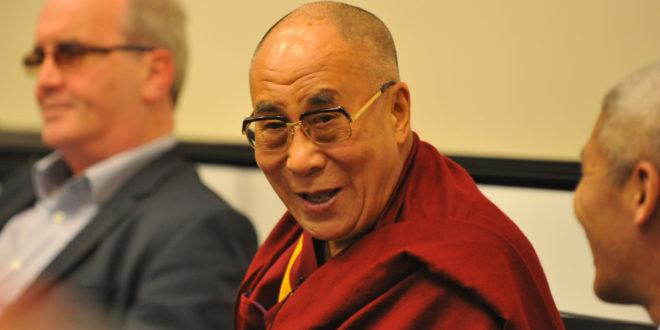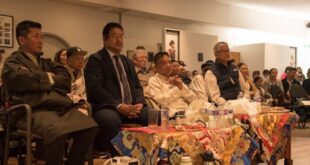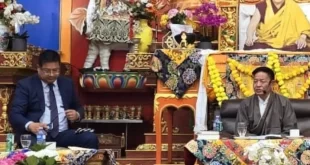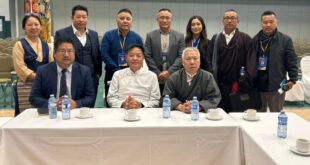
By Yang Jianli
What do Richard Spencer, Ann Coulter, and the Dalai Lama have in common? Each of them has been the target of college student protests opposing their speeches on campus.
But unlike Mr. Spencer and Ms. Coulter, His Holiness the 14th Dalai Lama was born on a straw mat in a cowshed to a poor Tibetan family, and is now one of the most beloved and sought after world leader
The most recent college campus speaker controversy involves the University of California at San Diego’s invitation to the Dalai Lama to deliver the commencement address on June 17. The invitation has triggered strong opposition from some Chinese students on campus.
As an ethnic Han Chinese myself, I am deeply troubled by the reaction of these Chinese students. Not because they are protesting, but because they are so decisively repeating the party line of the Chinese Communist government. Having studied in America where, unlike China, there is freedom of expression and the free flow of information, these Chinese students don’t seem to have taken advantage of these freedoms to go beyond the rhetoric and propaganda taught to them in China and judge for themselves the Dalai Lama’s contribution to humanity.

The Chinese student protesters’ say that their primary reasons for opposing this commencement speaker is their belief that the Dalai Lama is a “separatist,” seeking to split Tibet from China. They claim his name has been tainted by the so-called Tibetan “slavery” system in the past, and they say the Dalai Lama is “ill-suited to represent” the university’s message of “service to humanity.” They say that by allowing him to speak, UC San Diego is disrespecting the Chinese students and their families.
First, the Dalai Lama is not a separatist, as the Chinese government and UC San Diego protesters claim. I have personally known him for over two decades, and in both public and private meetings I have witnessed his great compassion for humanity. He has stood firm against violence and separatism, and has consistently shown a sincere desire to compromise and negotiate with the government in Beijing, even in the face of the Chinese government’s brutal treatment of Tibetans.The Dalai Lama abandoned the idea of Tibetan independence a long time ago and now promotes his Middle Way Approach, a policy that seeks genuine autonomy for Tibet under China’s current political system.
Second, most international scholars do not support the claim that Tibet was a society of “slaves” prior to China’s occupation. No doubt, Tibetan history is complicated, and traditional Tibetan society had its fair share of social issues. However, many scholars believe it is misleading to use the terms “serfdom” or “slavery” to describe Tibet at that time. China has demonized the Tibetan social structure that existed before the Chinese invasion as a “backward feudal society” or “evil serfdom.” Such characterizations aim to take a moral high ground to justify the regime’s illegal occupation of the country.
The Dalai Lama’s humble beginning impressed upon him the need for reforms in Tibetan society, something he immediately initiated upon his enthronement in 1950. Those reforms stopped when the Communists took the county by force in 1959 and the Dalai Lama had to flee to India. In exile, the Dalai Lama has continued his reform efforts, including introducing democracy to the exiled Tibetan government. The Dalai Lama ceded his political power completely in 2011 to empower exiled Tibetans to elect their own government leaders.
Finally, universities in America strive to be a platform for ideas and debate, exposing students and faculty to a wide range of speakers and viewpoints. American universities and schools have invited both former and current leaders of China to give speeches. The Dalai Lama has never expressed disrespect to China or Chinese citizens, so there can be no implied disrespect to the students at UC San Diego.
Certainly the students at UC San Diego have a right to protest. In fact, I’m glad to see they are exercising their Constitutional rights to freedom of expression and association—rights that they don’t have in China. What is disappointing is that their protests don’t show originality or freedom of thought; they are parroting verbatim the rhetoric of the Chinese government.
I want to encourage my young fellow Chinese at UC San Diego to take their act of freedom and liberty one step further and open their minds to new ideas and new thoughts. Don’t be so tightly chained to what you were taught to believe in China. Take this precious opportunity to listen to what the Dalai Lama has to say and then make your own judgment.
The Dalai Lama should be welcomed by all students, regardless of cultural and political background. He will provide a thought-provoking commencement speech, and challenge all to promote peace, pursue happiness, live with integrity, and remind us all that we are all interdependent and connected, including the Han and Tibetans.
Yang Jianli is president of Initiatives for China. He holds a PhD in Mathematics from UC Berkeley and a PhD in Political Economy from the Harvard University. He is a survivor of the Tiananmen Square Massacre and a former political prisoner in China.




